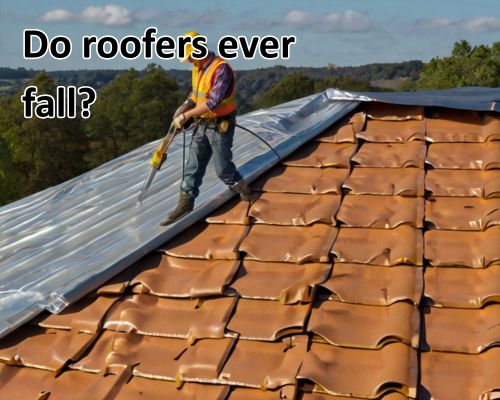
Do Roofers Ever Fall? A Look Into Safety Measures and Risks in New Jersey Roofing Industry
Roofing is a physically demanding job, and the risk of falling is one of the most pressing concerns for workers in the industry. Roofers are frequently tasked with navigating steep surfaces, working at great heights, and dealing with the unpredictability of weather conditions. With CJ Commercial Roofing NJ, we’ll explore whether roofers fall on the job, the safety measures that are in place to prevent such accidents, and what the roofing industry in New Jersey, USA, is doing to reduce these risks.

The Risks of Roofing
Roofing is one of the most hazardous professions in the United States. According to data from the U.S. Bureau of Labor Statistics (BLS), falls are the leading cause of death in the roofing industry, accounting for nearly 40% of roofing fatalities. While the job may seem straightforward—installing, repairing, or replacing roofs—roofers face numerous risks, especially when working on older homes or commercial buildings in areas like New Jersey, where weather patterns can fluctuate dramatically.
In New Jersey, roofers often work under challenging weather conditions, from the cold, icy winters to the hot, humid summers. These temperature variations can increase the likelihood of dangerous working conditions. Ice, rain, and snow can make roofs slippery, while high winds can affect the stability of ladders, scaffolding, and other equipment. Additionally, as New Jersey is home to many homes with steep rooflines, roofers are frequently at risk of losing their balance and falling.
The Reality: Do Roofers Actually Fall?
The question, “Do roofers ever fall?” might seem straightforward, but it’s important to understand the severity of such falls and the likelihood of them happening. The answer is, unfortunately, yes—roofers do fall. However, the frequency of falls varies depending on the quality of safety protocols in place and the experience of the roofer.
In New Jersey, roofing companies are required to adhere to strict Occupational Safety and Health Administration (OSHA) guidelines. These standards are designed to protect roofers from falls, which are the leading cause of fatalities in the industry. OSHA mandates that roofers working six feet or more above a lower level must be protected by guardrails, safety nets, or personal fall arrest systems. However, despite these regulations, falls still occur due to lapses in safety practices, human error, or the failure to use personal protective equipment (PPE).
For example, roofers may forget to secure their harnesses properly or may not wear fall arrest systems while working on less steep roofs. Additionally, fatigue from working long hours or the pressure to meet deadlines can lead to lapses in safety. A survey by the National Institute for Occupational Safety and Health (NIOSH) found that nearly 40% of roofers reported that they had fallen at least once during their careers.
Safety Measures in New Jersey Roofing
Roofing companies in New Jersey are keenly aware of the dangers associated with the profession and have implemented numerous safety measures to mitigate the risks. Local New Jersey roofers are increasingly focused on training, fall protection equipment, and the importance of proper safety protocols. Below are some of the most effective strategies for preventing falls in the roofing industry:
1. Proper Training and Education
One of the most effective ways to prevent falls is through proper training. Roofing companies in New Jersey invest time and resources into ensuring that their workers are well-equipped to recognize potential hazards and handle them safely. This includes both initial training and ongoing refresher courses on topics such as fall protection, ladder safety, and hazard recognition.
Roofing companies like those based in areas like Trenton, Newark, and Atlantic City prioritize providing workers with the knowledge to assess roof conditions and make safe decisions. Training also includes practical exercises, such as simulating real-world conditions, to ensure roofers understand the importance of PPE and safety equipment.
2. Use of Personal Fall Arrest Systems (PFAS)
Personal Fall Arrest Systems (PFAS) are crucial safety equipment for roofers in New Jersey. These systems, which consist of a harness, lanyard, and anchor points, are designed to stop a roofer from falling too far if they lose their balance or footing. OSHA regulations require roofers to use PFAS when working at heights of six feet or more.
Roofing companies in Jersey City, Paterson, and other urban areas are increasingly adopting advanced fall protection technologies. This includes high-quality PFAS that can absorb the shock of a fall and minimize the risk of injury. Additionally, many companies invest in advanced training to ensure roofers are familiar with the proper use of these systems.
3. Scaffolding and Guardrails
Another important safety measure is the installation of guardrails and scaffolding around the edges of roofs. This is particularly important in areas with steep rooflines, such as the many historic homes in New Jersey’s Princeton and Montclair neighborhoods. Guardrails act as physical barriers to prevent roofers from accidentally stepping off the edge of the roof.
Additionally, scaffolding provides a stable platform for roofers to work on, reducing the risk of a fall. When combined with proper fall arrest systems, guardrails, and scaffolding can significantly reduce the likelihood of accidents on the job.
4. Weather Monitoring
Weather conditions in New Jersey can change rapidly, and roofers are frequently exposed to the elements. To reduce the risk of falls during inclement weather, many roofing companies in New Jersey closely monitor weather patterns. Roofing contractors may delay work if wind speeds become dangerously high or if rain or snow creates slippery conditions.
In areas like Cape May and Asbury Park, where coastal weather can be particularly unpredictable, roofing companies may have to make quick decisions about whether it is safe to continue working. Delays in roofing projects due to weather are not uncommon in these areas, but it is a necessary safety precaution.
For more, go to CJ Commercial Roofing NJ.
Legal Protections for Roofers in New Jersey
New Jersey law provides several protections for roofers who may be at risk of falling on the job. Under state law, roofing companies are required to carry workers’ compensation insurance, which provides benefits for workers who are injured on the job. This includes coverage for medical expenses and lost wages due to injuries sustained in a fall.
Furthermore, New Jersey’s Workers’ Rights Act mandates that employers provide a safe working environment. If a roofer is injured due to unsafe working conditions or the failure of a company to provide proper fall protection, they have the right to file a lawsuit against the employer. In addition, OSHA guidelines and state regulations help ensure that roofing contractors maintain a high standard of safety for their employees.
Conclusion
While the risk of falling remains a significant concern for roofers in New Jersey, industry standards and safety measures have made a notable impact on reducing accidents. The combination of proper training, advanced safety equipment, and strict adherence to safety regulations ensures that roofers are better protected than ever before. However, falls still occur, underscoring the need for ongoing vigilance and commitment to safety in this demanding profession.
In New Jersey, local roofing companies continue to prioritize the health and well-being of their workers, and safety remains a top concern. Roofers in cities like Newark, Toms River, and Cherry Hill can feel confident knowing that they are working in an industry that takes the risks seriously and is doing everything possible to minimize falls.
By investing in the right tools, training, and practices, New Jersey’s roofing companies are taking significant steps toward making the profession safer for everyone involved.

